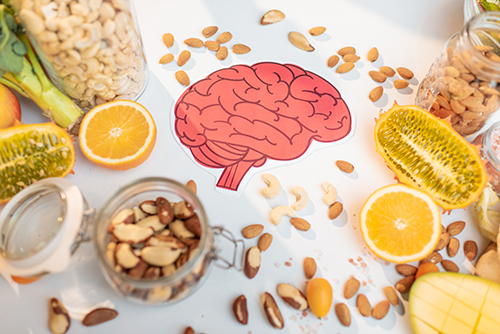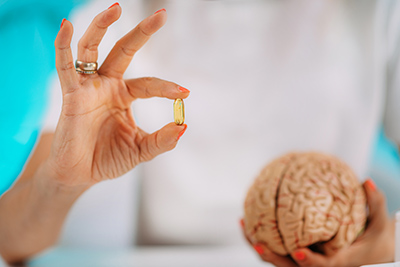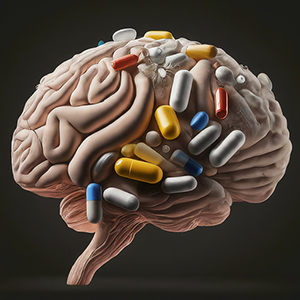Contents
There are several reasons why people take dietary supplements to support brain health. For most people, supplements help them meet the recommended dosage of vitamins and minerals, which their respective diets may not be able to meet. Others take supplements to help resolve or prevent health problems or boost their health in certain areas, such as their brain health. Many of the supplements listed below can help improve your brain and overall health, which is excellent!

Omega-3 Fatty Acids
Omega-3 fatty acids are well-known for their heart health benefits, but this healthy fat is also beneficial for brain health. It can help improve brain function and memory, plus omega-3 fatty acids may also be effective in lessening the risk for Alzheimer’s disease and dementia.
Omega-3 fatty acids can be found in our diets. Fatty fish, flaxseed, soybeans, and nuts are all excellent sources of omega-3s. If you’re not fond of these foods or have diet restrictions, taking omega-3 supplements could benefit you.
Vitamin D3
Vitamin D3 is often listed for improving health, regardless of the body part. It is commonly associated with being essential for bone health, strengthening, and providing energy benefits. It is also crucial in assisting with brain function.
Your brain is responsible for your emotional and mental health, and getting enough vitamin D3 can have positive benefits in that area. These benefits are specifically for helping boost your mood and preventing mental health conditions such as depression. It may also help prevent Alzheimer’s disease.
Vitamin D3 is found in many of the foods we eat. Still, unfortunately, there are many people deficient in vitamin D3. Taking supplements is one way to guarantee that you are getting a suitable daily amount.
B Vitamins

Vitamin B, particularly B6, B9, and B12, can help support brain health and healthy development. A good vitamin B complex will cover all the essential B vitamins needed for caring for your brain.
Vitamin B’s brain-boosting effects include improved memory, which may help prevent the development of Alzheimer’s disease and dementia. In addition, vitamin B can help you feel more energized and help you focus better. Vitamin B12 is also used to help minimize symptoms of anxiety, depression, and stress.
Antioxidant Supplements
Antioxidant supplements, like vitamins A, C, and E, are all excellent in helping slow down age-related cognitive decline. These supplements work by protecting the cells from oxidation caused by free radicals. Damage in the brain cells may contribute to cognitive decline caused by aging. Keeping your brain cells healthy can help keep you sharp and fight mental fog.
Ginkgo Biloba

Ginkgo biloba leaves have been used in Chinese herbal medicine for centuries. One of the well-known benefits of ginkgo Biloba is improved memory and sharpened thinking. Ginkgo Biloba can also help increase blood flow to the brain. The increase in blood flow can, of course, lead to better brain health.
Ginkgo Biloba can help boost memory and cognitive speed and can help slow the progression of dementia symptoms. However, to be clear, it does not prevent dementia or Alzheimer’s disease.
L-theanine
L-theanine is more commonly associated with improving mood and relieving stress; mood and anxiety are closely linked to brain performance. Therefore, we can consider L-theanine a brain-boosting supplement. Plus, L-theanine has shown to be an effective supplement in increasing focus and attention when paired with caffeine. L-theanine supplements are available, and there are also ‘L-theanine and Caffeine Supplements.’
Supplements are only helpful if your diet is inadequate. So for improved brain health, eat a nutritious diet, get plenty of sunshine and sleep, and if all else fails, find a supplement that can benefit you.
Supplements have enormous potential to help keep our brains healthy. Taking most of these supplements benefits the brain and improves overall health.
DISCLAIMER: All content on this website is presented solely for educational and informational objectives. Do not rely on the information provided as a replacement for advice, diagnosis, or treatment from a qualified medical expert. If you are pregnant, nursing, or have any preexisting medical concerns, talk to your doctor before using any herbal or natural medicines.
References
- Van der Worp HB, et al. (2017). Long-chain polyunsaturated fatty acids (PUFAs) for the treatment of mild cognitive impairment and Alzheimer’s disease. Neurology, 88(3), e3-e12.
- O’Leary F, et al. (2016). Effects of high-dose vitamin B on cognitive aging: a randomized controlled trial. American Journal of Clinical Nutrition, 103(4), 921-929.
- Cochrane Database of Systematic Reviews (2012). Ginkgo biloba for cognitive impairment and dementia. https://www.cochranelibrary.com/cdsr/doi/10.1002/14651858.CD003120.pub3/full
- Giesbrecht T, et al. (2010). The combination of L-theanine and caffeine improves cognitive performance and increases subjective alertness. Nutritional Neuroscience, 13(6), 283-290. https://www.tandfonline.com/doi/abs/10.1179/147683010X12611460764840
- National Institutes of Health (NIH). (2022). St. John’s wort. National Center for Complementary and Integrative Health (NCCIH). https://www.nccih.nih.gov/health/st-johns-wort
- National Institutes of Health (NIH). Office of Dietary Supplements. (2023). Dietary Supplement Fact Sheets. https://ods.od.nih.gov/factsheets/list-all
- Global Council on Brain Health. (2018). Brain Health Supplements: What You Need to Know. AARP. https://www.aarp.org/health/brain-health/global-council-on-brain-health/supplements
